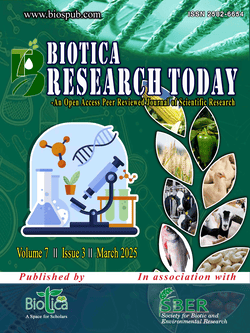
Water Quality Management in Fish Ponds for Optimum Fish Production
Huirem Bharati*
ICAR-Research Complex for NEH Region, Tripura Centre, Lembucherra, Tripura (799 210), India
Lopamudra Sahoo
ICAR-Research Complex for NEH Region, Tripura Centre, Lembucherra, Tripura (799 210), India
Vinay Singh
ICAR-Research Complex for NEH Region, Tripura Centre, Lembucherra, Tripura (799 210), India
B.U. Choudhury
ICAR-Research Complex for NEH Region, Tripura Centre, Lembucherra, Tripura (799 210), India
Martina Meinam
Dept. of Extension, Economics and Statistics, College of Fisheries, CAU (Imphal), Lembucherra, Tripura (799 210), India
H. Lembisana Devi
Krishi Vigyan Kendra, Charoi-Chagotlong, Tamenglong, Manipur (795 159), India
Y. Jackie Singh
Dept. of Extension, Economics and Statistics, College of Fisheries, CAU (Imphal), Lembucherra, Tripura (799 210), India
DOI: NIL
Keywords: Aquaculture, Fish production, Pond, Water quality
Abstract
Water quality is a key factor determining the success of aquaculture because it has a direct effect on the health, growth and productivity of fish. Low fish yield and financial losses can occur due to stress (due to low water quality), indirectly leading to diseases and death. Phytoplankton is a part of the natural food web in aquatic systems and is consumed by zooplankton and grazers, which are favourable for fish metabolism and survival if dissolved oxygen, pH, ammonia, turbidity and temperature are maintained within acceptable thresholds. Physico-chemicals imbalances can impair physiological functions and decelerate growth and they contribute to susceptibility to infections. Maintaining water quality is indispensable for good health of aquatic organisms and periodic monitoring and timely management is essential to avoid unwanted conditions and maintain a stable aquatic environment. Through maintaining appropriate water conditions, fish farmers can increase survival rates, improve growth performance and improve profitability. As such, water quality management is not only a necessary condition for healthy fish farming but also a significant factor for long-term sustainability and profitability in aquaculture.
Downloads
not found
Reference
Anonymous, 2024. Dissolved Oxygen. In: Causal Analysis/Diagnosis Decision Information System (CADDIS): US Environmental Protection Agency (EPA) (website). Available at: https://www.epa.gov/caddis/dissolved-oxygen. Accessed on: 25th December, 2024.
Boyd, C.E., 1998. Water Quality for Pond Aquaculture. Research and Development Series No. 43. International Center for Aquaculture and Aquatic Environments, Alabama Agricultural Experiment Station, Auburn University, Alabama. p. 37. URL: http://hdl.handle.net/11200/49690.
Cole, B.A., Boyd, C.E., 1986. Feeding rate, water quality and channel catfish production in ponds. The Progressive Fish-Culturist 48(1), 25-29. DOI: https://doi.org/10.1577/1548-8640(1986)48<25:FRWQAC>2.0.CO;2.
Hemal, M.M., Rahman, A., Nurjahan., Islam, F., Ahmed, S., Kaiser, M.S., Ahmed, M.R., 2024. An integrated smart pond water quality monitoring and fish farming recommendation aquabot system. Sensors 24(11), 3682. DOI: https://doi.org/10.3390/s24113682.
Xu, Z., Boyd, C.E., 2016. Reducing the monitoring parameters of fish pond water quality. Aquaculture 465, 359-366. DOI: https://doi.org/10.1016/j.aquaculture.2016.09.031.
